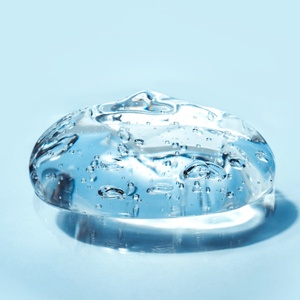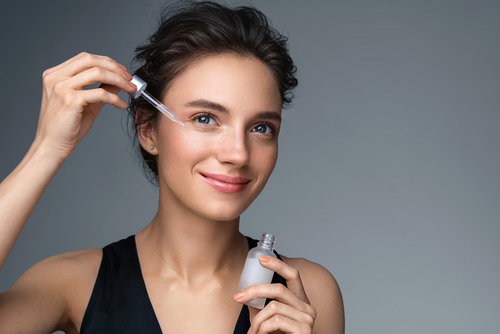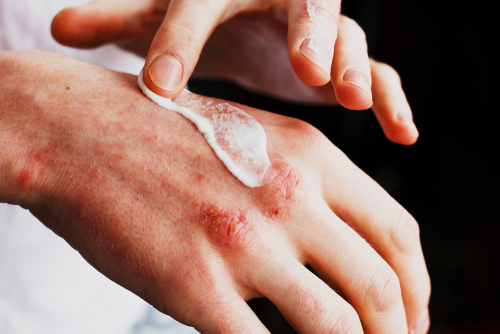Blog
Welcome to FaceForward
Get the scoop on all things beauty, wellness, and skincare.

Hyaluronic acid has become increasingly popular in the skincare industry, even heralded as one of the most effective ingredients in modern skincare.
While hyaluronic acid can help you with firm and youthful-looking skin, the key is understanding how and when to use it properly.
If you’ve heard of hyaluronic acid and wondered if it's worth the hype, this article is for you.
Here’s everything you need to know about hyaluronic acid and why you should consider it for your skincare routine. We also share dermatologist-approved tips on how to use hyaluronic acid to improve the quality of your skin.
Whether you’re looking to smooth wrinkles or banish blemishes, read on to find out how hyaluronic acid can work for you.
Hyaluronic acid is a natural, endogenous glucose-based substance produced by your body.
It’s primarily responsible for maintaining healthy moisture levels throughout various organs and systems, like the eyes and joints. Since hyaluronic acid is a humectant, it acts similar to a sponge by attracting water from the environment and into the upper layers of the skin.
It can attract up to 1,000 times its weight in water which is why hyaluronic acid is so effective at moisturizing skin.
This is also why hyaluronic acid has been linked to anti-aging benefits. With its hydrating properties, hyaluronic acid can improve the appearance of fine lines and wrinkles, which leaves the complexion looking more firm and youthful.
In skincare products, hyaluronic acid is formulated to mimic the substance that our body produces naturally. This is why it tends to be non-irritating yet strong enough to provide a range of skin benefits.
Oral hyaluronic acid supplements can also help the body manage acid reflux symptoms like stomach pain and heartburn.

In its natural form, hyaluronic acid draws water from outside of the skin to the uppermost layers to help keep it moisturized.
Moisture is vital for maintaining a strong skin barrier, the outermost layer of the skin that protects it from damage and pathogens or infection. When the skin is adequately moisturized, it’s better able to support the essential cells that make up the skin barrier and help it to function properly.
Unfortunately, the hyaluronic acid that is produced by the body is susceptible to damage from external factors like UV radiation from the sun, pollution, and other environmental detractors.
When hyaluronic acid molecules come into contact with these elements, they begin to break down, contributing to the skin becoming dry or irritated.
The body’s natural ability to produce hyaluronic acid also slows down as we age. This means fewer HA-molecules are readily available to maintain adequate skin moisture levels. This makes the skin more prone to the signs of premature aging and decreases its ability to heal and repair.
As a humectant that draws water to the skin and contributes to keeping it moisturized, hyaluronic acid helps to keep the skin barrier strong and healthy. When this protective barrier is strongest, it increases resilience and the skin’s ability to protect itself from harmful external factors.
Since hyaluronic acid is a moisturizing ingredient, it’s also great for reducing common signs of aging like fine lines and wrinkles.
Hyaluronic acid stimulates the skin’s cell turnover process. This is when the skin sheds dead skin cells, and impurities along with it, revealing new skin cells beneath. New and healthy cells help the skin to maintain elasticity, creating firm, radiant-looking skin.
By promoting the production of new cells, hyaluronic acid helps the skin maintain that youthful, supple look.
Acne develops when your pores become clogged with oil and dead skin cells. While most cases of acne are mild, some breakouts can be severe, painful, and inflammatory.
Hyaluronic acid can help to regulate inflammation, our body's response to irritants, and help to attract important wound-healing immune cells, potentially helping heal wounds and repair scar tissue. Simply put, hyaluronic acid may aid in healing acne lesions and fade scarring.
Hyaluronic acid may be an effective acne treatment since it can regulate sebum, too. This is the natural oil produced by the skin to keep it moisturized. When the skin produces an excessive amount of sebum, it can clog pores and cause more frequent breakouts.
Sebum can also combine with bacteria on the skin, causing it to infect pores. Since hyaluronic acid can help our skin maintain normal sebum levels, it may reduce the frequency of breakouts and help keep skin clear.
This makes it a good option for people with oily or combination skin prone to breakouts. We discuss the benefits of hyaluronic acid for acne in more detail later on.
Eczema is a condition that causes dry skin, itchiness, and inflammation. This can also lead to scarring and hyperpigmentation if left untreated.
Hyaluronic acid’s potent skin hydration properties make it an effective treatment for eczema. Not only does it help to restore the skin’s natural moisture barrier, but its anti-inflammatory properties also help it to soothe irritated skin.

As mentioned above, acne develops when pores become clogged with oil, dead skin cells, and bacteria. It can present as small pimples or bigger, painful cysts, depending on the severity of the breakout.
When we develop acne, our first instinct is often to use harsh exfoliants or chemicals to combat blemishes. However, this can strip the skin of its natural protective oils and cause it to dry out. Acne can actually get worse, and you may break out more often.
This is where hyaluronic acid comes in.
While hyaluronic acid alone is probably not enough to treat and clear your acne, it has a few noteworthy abilities that can combat the symptoms of a breakout.
Remember, hyaluronic acid can regulate sebum production, reduce inflammation, and speed up the skin’s healing process without stripping it entirely of its protective oils.
Given its nonirritating nature and its moisturizing properties, hyaluronic acid is also considered a good option for people with sensitive skin.
Since our bodies produce hyaluronic acid naturally, most people's skin is already used to it.
This suggests that hyaluronic acid is an effective skincare ingredient for most skin types and concerns. However, different forms of hyaluronic acid may cause some adverse reactions. This is often the case with injectable hyaluronic acid, called fillers.
Dermatologists note that side effects like irritation, swelling, and joint pain are the body’s reaction to the injection, not necessarily the hyaluronic acid.
Oral hyaluronic acid supplements may also cause dry skin or irritation and swelling, although this is rare.
The key to unlocking all of the benefits of hyaluronic acid is knowing when and how to use it correctly.
Many dermatologists recommend incorporating a hyaluronic acid serum with a 1-2% concentration into your regular skincare routine. This formulation is generally low enough to prevent any rare side effects, but potent enough to give your skin visible results.
A serum is also a good option because these products are formulated for a more concentrated effect on the skin.
Hyaluronic acid serums are often formulated with sodium hyaluronate which allows it to work deeper within the skin.
A hyaluronic acid product also works well with vitamin C and retinoids since they deliver similar anti-aging and acne-fighting benefits.
Retinoids, such as tretinoin and retinol, are powerful anti-aging ingredients that stimulate the cell turnover process and rejuvenate the skin. Similarly, vitamin C can boost the production of collagen—a protein essential for maintaining firm and healthy skin.
Although infrequent, vitamin C and retinoids can lead to skin irritation and dryness. Hyaluronic acid can be used with these active ingredients to counteract any adverse reactions and keep the skin feeling soft and moisturized.
There’s no one-size-fits-all solution when it comes to treating your skin concerns. The severity of your breakouts and signs of aging are unique to you and your biology.
The way you treat your skin should be equally unique and tailored to your personal situation.
While ingredients like hyaluronic acid can help relieve some acne and aging symptoms, a more targeted treatment may make things even easier and more effective.
At Nava MD, we specialize in skincare products that promote a strong, healthy, and radiant complexion, all prescribed with a dermatologist’s help and sent to your door if appropriate.
Nava MD’s custom prescriptions may include ingredients like niacinamide, tretinoin, or clindamycin that work to clear the skin, stop acne, and fight signs of aging.
Many of our prescription and over-the-counter solutions contain or are shown to work well with hyaluronic acid to create a powerful treatment for common skin issues.
Not only that, but our online consultations ensure that you start your skincare journey on the right foot. After completing a short form, one of our board-certified dermatologists will provide you with a unique treatment plan to suit your skin’s needs.
You also have ongoing access to our clinicians, who are ready to provide expert advice or skincare help whenever you need them.
With Nava MD, it’s easier than ever to to get professional skincare (from home). Click here to get started with Nava MD today.
This article is intended for informational purposes only and should not be considered medical advice.
Consult a healthcare professional or call a doctor in the case of a medical emergency